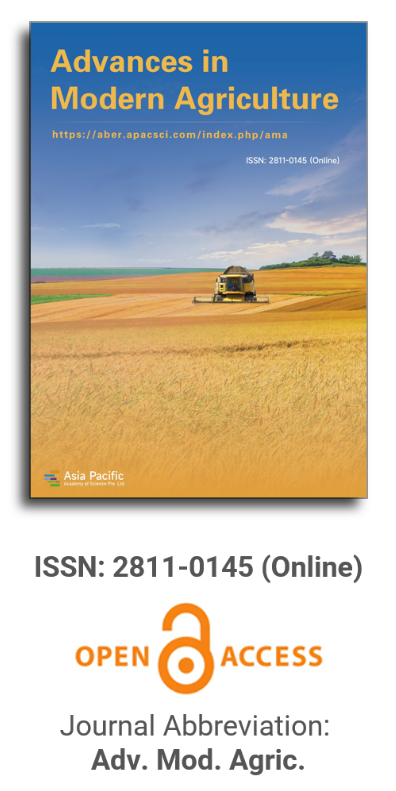


Family agriculture for inclusive rural development
Vol 2, Issue 2, 2021
VIEWS - 4772 (Abstract)
Download PDF
Abstract
The indigenous Mayan populations of the Yucatan Peninsula of Mexico have practiced the ancient traditions of family farming, especially home gardens, to ensure their food security. With the objective of improving traditional practice with modern science, data were collected on the structural complexity and functional diversity of 20 home gardens selected at random in each of the following five communities: X-Maben, X-Pichil, X-Yatil, San José II, and Melchor Ocampo. In addition, group discussions were organized to elucidate the management strategy practiced by the indigenous people. The results show that home gardens are managed mainly by women. The main purpose of growing and maintaining home gardens is to guarantee the production of nutritious food year round. Finally, the home gardens also serve secondary purposes, such as the provision of products and services for traditional medicine. This study suggests that home gardens should be promoted and invested in to improve inclusive development strategies for contexts with similar socio-cultural and biophysical circumstances.
Keywords
References
- Eyzaguirre PB, Linares OF. Home Gardens and Agrobiodiversity. Smithsonian Institution Press; 2004.
- Galhena DH, Freed R, Maredia KM. Home gardens: A promising approach to enhance household food security and wellbeing. Agriculture & Food Security 2013; 2: 8. doi: 10.1186/2048-7010-2-8
- Torquebiau E. Are tropical agroforestry home gardens sustainable? Agriculture, Ecosystems & Environment 1992; 41(2): 189–207. doi: 10.1016/0167-8809(92)90109-O
- Méndez VE, Lok R, Somarriba E. Interdisciplinary analysis of homegardens in Nicaragua: Micro-zonation, plant use and socioeconomic importance. Agroforestry Systems 2001; 51: 85–96. doi: 10.1023/A:1010622430223
- Kumar BM, Nair PKR. The enigma of tropical homegardens. In: New Vistas in Agroforestry. Springer Netherlands; 2004. pp. 135–152. doi: 10.1007/978-94-017-2424-1_10
- Weersum KF. Tree gardening and taungya on Java: Examples of agroforestry techniques in the humid tropics. Agroforestry Systems 1982; 1(1): 53–70. doi: 10.1007/bf00044329
- Brownrigg LA. Home Gardening in International Development: What the Literature Shows, Including an Anannotated Bibliography, and Inventories of International Organizations Involved in Home Gardening and Their Projects. League for International Food Education; 1985.
- Fernandes ECM, Nair PKR. An evaluation of the structure and function of tropical homegardens. Agricultural Systems 1986; 21(4): 279–310. doi: 10.1016/0308-521X(86)90104-6
- Soemarwoto O. Homegardens: A traditional agroforestry system with a promising future. In: Steppler HA, Nair PKR (editors). Agroforestry: A Decade of Development. ICRAF; 1987. pp. 157–170.
- Caballero J. Maya homegardens: Past, present and future. Etnoecológica 1992; 1(1): 35–54.
- UNDP. Inclusive development (Spanish). Available online: https://www.undp.org/es/el-salvador/desarrollo-inclusivo (accessed on 28 October, 2016).
- Arias L. The current Mayan-Yucatec family or solar garden (Spanish). In: Mariaca Méndez R (editor). The Family Garden of the Mexican Southeast (Spanish). ECOSUR; 2012. pp. 111–130.
- Flores Guido JS. Floristic diversity, uses and origin of genetic material of species from home gardens of the Yucatan Peninsula (Spanish). In: Mariaca Méndez R (editor). The Family Garden of the Mexican Southeast (Spanish). ECOSUR; 2012. pp. 149–175.
- Mariaca Méndez R. The Family Garden of the Mexican Southeast (Spanish). ECOSUR; 2012.
- Montagnini F. Homegardens of Mesoamerica: Biodiversity, food security, and nutrient management. In: Tropical Homegardens: A Time-Tested Example of Sustainable Agroforestry. Springer Netherlands; 2006. pp. 61–84. doi: 10.1007/978-1-4020-4948-4_5
- Cahuich-Campos D. The Mayan garden and the daily diet of the peasant families of X-Mejía, Hopelchén, Campeche. In: Mariaca Méndez R (editor). The Family Garden of the Mexican Southeast (Spanish). ECOSUR; 2012. pp. 197–229.
- Mohan S, Alavalapati JRR, Nair PKR. Financial analysis of homegardens: A case study from Kerala state, India (Spanish). In: Tropical Homegardens: A Time-Tested Example of Sustainable Agroforestry. Springer Netherlands; 2006. pp. 283–296. doi: 10.1007/978-1-4020-4948-4_16
- Cámara-Córdova J. Contribution of the family garden to the rural economy, adaptation to climate change and productive conversion in Tabasco, Mexico (Spanish). In: Mariaca Méndez R (editor). The Family Garden of the Mexican Southeast (Spanish). ECOSUR; 2012. pp. 372–390.
- Torquebiau E, Penot E. Ecology versus economics in tropical multistrata agroforests. In: Tropical Homegardens: A Time-Tested Example of Sustainable Agroforestry. Springer Netherlands; 2006. pp. 269–282. doi: 10.1007/978-1-4020-4948-4_15
- Food and Agriculture Organization (FAO). World food summit. Available online: https://www.fao.org/3/w3548e/w3548e00.htm (accessed on 8 August 2015).
- Vía Campesina. World food summit. Available online: https://viacampesina.org/en/index.php/organisation-mainmenu-44 (accessed on 18 September 2016).
- United Nations. Millennium development goals and beyond 2015. Available online: http://www.un.org/millenniumgoals/poverty.shtml (accessed on 25 August 2015).
- Food and Agriculture Organization (FAO). State of Food and Agriculture. Food System for Better Nutrition. FAO; 2013.
- National Council for Evaluation of Social Development Policy (CONEVAL). Poverty Report in Mexico, 2012. CONEVAL; 2013.
- Angel-Pérez AL. Homegardens and the dynamics of Totonac domestic groups in Veracruz, Mexico. Anthropological Notebooks 2013; 19: 5–22.
- United Nations Environment Programme (UNEP). Consideration of initial elements: Recognizing indigenous and local knowledge and building synergies with science. Available online: http://www.ipbes.net/plenary/ipbes-1.html (accessed on 4 December 2015).
- Rebollar-Domínguez S, Santos-Jiménez VJ, Tapia-Torres NA, et al. Family gardens, an experience in Chancah Veracruz, Quintana Roo (Spanish). Polibotánica 2008; 25: 135–154.
- DBCity. Felipe Carrillo Puerto. Available online: http://es.db-city.com/M%C3%A9xico-Quintana-Roo-Felipe-Carrillo-Puerto (accessed on 18 September 2016).
- Bautista F, Palma-López D, Huchin-Malta W. Update of the soil classification of the state of Yucatán (Spanish). In: Bautista F, Palacio G (editors). Characterization and Management of Soils in the Yucatan Peninsula: Agricultural, Forestry and Environmental Implications (Spanish). National Institute of Ecology; 2005. pp. 105–122.
- National Institute of Statistics and Geography (INEGI). Available online: http://sipse.com/novedades/quintana-roopoblacion-indigena-encuesta-intercensal-2015-inegi-lenguamaya-184159.html (accessed on 18 September 2016).
- National Institute of Statistics and Geography (INEGI). Available online: http://www.cuentame.inegi.org.mx/monograf ias/informacion/qroo/poblacion/diversidad.aspx?tema=me&e=23 (accessed on 18 September 2016).
- Tageo. Melchor Ocampo, Quintana Roo. Available online: http://www.tageo.com/index-e-mx-v-23-d-m2398966.htm (accessed on 28 October 2016).
- Tageo. X-Pichil, Quintana Roo. Available online: http://www.tageo.com/index-e-mx-v-23-d-m2399119.htm (accessed on 28 October 2016).
- Dices. Melchor Ocampo, Quintana Roo, Felipe Carrillo Puerto, Chetumal. Available online: http://www.dices.net/mapas/mexico/mapa.php?nombre=Melchor-Ocampo&id=110414 (accessed on 29 October 2016).
- Kitzinger J. Qualitative research. Introducing focus groups. BMJ 1995; 311: 299–302. doi: 10.1136/bmj.311.7000.299
- Raymond CM, Fazey I, Reed MS, et al. Integrating local and scientific knowledge for environmental management. Journal of Environmental Management 2010; 91(8): 1766–1777. doi: 10.1016/j.jenvman.2010.03.023
- Convention of Biological Diversity (CBD). The Tkarihwaié: RI code of Ethical Conduct to Ensure Respect for the Cultural and Intellectual Heritage of Indigenous and Local Communities Relevant to the Conservation and Sustainable Use of Biological Diversity. CBD; 2011.
- De Clerck FAJ, Negreros-Castillo P. Plant species of traditional Mayan homegardens of Mexico as analogs for multistrata agroforests. Agroforestry Systems 2000; 48: 303–317. doi: 10.1023/A:1006322612362
- Toledo VM. Indigenous peoples, strategic actors for the Mesoamerican Biological Corridor (Spanish). Biodiversitas 2003; 47: 8–15.
- Millennium Ecosystem Assessment (MEA). Ecosystems and Human Well-Being: Synthesis. Island Press; 2005.
- Lope-Alzina DG, Howard PL. The structure, composition, and functions of homegardens: Focus on the Yucatán Peninsula. Revista Etnoecologica 2012; 9(1): 17–41.
- Leclerc C, Thuillet AC. Wild and cultivated biodiversity and natural resource management. Montpellier, France. Agrop. Int 2014; 19: 35–47.
- Gupta J, Vegelin C. Sustainable development goals and inclusive development. International Environmental Agreements: Politics, Law and Economics 2016; 16: 433–448.
Supporting Agencies
Copyright (c) 2021 Laksmi Reddiar Krishnamurthy, Sumithra Krishnamurthy, Indumathi Rajagopal, Arturo Peralta Solare

This work is licensed under a Creative Commons Attribution 4.0 International License.

This site is licensed under a Creative Commons Attribution 4.0 International License (CC BY 4.0).

Prof. Zhengjun Qiu
Zhejiang University, China

Cheng Sun
Academician of World Academy of Productivity Science; Executive Chairman, World Confederation of Productivity Science China Chapter, China
Indexing & Archiving
In the realm of modern agriculture, the integration of cutting-edge technologies is revolutionizing the way we approach sustainable farming practices. A recent study published in Advances in Modern Agriculture titled "Classification of cotton water stress using convolutional neural networks and UAV-based RGB imagery" has garnered significant attention for its innovative approach to precision irrigation management. Conducted by researchers from Institute of Data Science and the AgriLife Research and Extension Center of Texas A&M University (authors's information is below). This study introduces a novel method for classifying cotton water stress using unmanned aerial vehicles (UAVs) and convolutional neural networks (CNNs), offering a powerful solution for optimizing water use in agriculture.
Modern agricultural technology is evolving rapidly, with scientists collaborating with leading agricultural enterprises to develop intelligent management practices. These practices utilize advanced systems that provide tailored fertilization and treatment options for large-scale land management.
This journal values human initiative and intelligence, and the employment of AI technologies to write papers that replace the human mind is expressly prohibited. When there is a suspicious submission that uses AI tools to quickly piece together and generate research results, the editorial board of the journal will reject the article, and all journals under the publisher's umbrella will prohibit all authors from submitting their articles.
Readers and authors are asked to exercise caution and strictly adhere to the journal's policy regarding the usage of Artificial Intelligence Generated Content (AIGC) tools.
Asia Pacific Academy of Science Pte. Ltd. (APACSCI) specializes in international journal publishing. APACSCI adopts the open access publishing model and provides an important communication bridge for academic groups whose interest fields include engineering, technology, medicine, computer, mathematics, agriculture and forestry, and environment.



.jpg)
.jpg)

.jpg)
